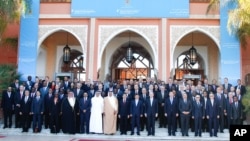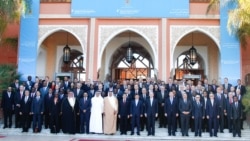On December 11th, the United States formally recognized a new opposition coalition as the legitimate representative of the Syrian people. As President Obama said:
“We've made a decision that the Syrian Opposition Coalition is now inclusive enough, is reflective and representative enough of the Syrian population that we consider them the legitimate representative of the Syrian people in opposition to the Assad regime, and so we will provide them recognition.”
This is an important step, both diplomatically and in terms of offering opportunities for increased United States assistance, said Deputy Secretary of State William Burns at the 4th Ministerial of the Friends of the Syrian People Meeting. “In our view, both the political and practical significance of recognition is that it both helps to accelerate change in Syria, change which is coming, and to prepare for it.”
And there is no doubt that change is coming, said Deputy Secretary Burns, “and we continue to maintain that the only way forward is for [Bashar al-] Assad to step aside and give way to an effective transitional governing body and ultimately to an inclusive, democratic, post-Assad Syria.”
But in the meantime, said Deputy Secretary Burns, “we look to the coalition to continue creating more formal structures within the opposition and to accelerate planning for a democratic political transition that protects the rights, the dignity, and the aspirations of all Syrians and all communities. That means taking concrete steps to include women and minorities, engage with religious leaders and civil society, and discourage reprisals and inter-communal violence,” he said.
By formally recognizing the Syrian Opposition Coalition as the legitimate voice of the Syrian people, the United States affirms “the vision of Syria’s future that the Syrian Opposition Coalition represents, a vision of a Syria that’s democratic, that’s pluralistic, that’s inclusive, that’s unified,” said Secretary Burns.
“The road ahead will not be easy, but it holds enormous promise for a better future for all Syrians with the strong support of all of us in the international community.”
“We've made a decision that the Syrian Opposition Coalition is now inclusive enough, is reflective and representative enough of the Syrian population that we consider them the legitimate representative of the Syrian people in opposition to the Assad regime, and so we will provide them recognition.”
This is an important step, both diplomatically and in terms of offering opportunities for increased United States assistance, said Deputy Secretary of State William Burns at the 4th Ministerial of the Friends of the Syrian People Meeting. “In our view, both the political and practical significance of recognition is that it both helps to accelerate change in Syria, change which is coming, and to prepare for it.”
And there is no doubt that change is coming, said Deputy Secretary Burns, “and we continue to maintain that the only way forward is for [Bashar al-] Assad to step aside and give way to an effective transitional governing body and ultimately to an inclusive, democratic, post-Assad Syria.”
But in the meantime, said Deputy Secretary Burns, “we look to the coalition to continue creating more formal structures within the opposition and to accelerate planning for a democratic political transition that protects the rights, the dignity, and the aspirations of all Syrians and all communities. That means taking concrete steps to include women and minorities, engage with religious leaders and civil society, and discourage reprisals and inter-communal violence,” he said.
By formally recognizing the Syrian Opposition Coalition as the legitimate voice of the Syrian people, the United States affirms “the vision of Syria’s future that the Syrian Opposition Coalition represents, a vision of a Syria that’s democratic, that’s pluralistic, that’s inclusive, that’s unified,” said Secretary Burns.
“The road ahead will not be easy, but it holds enormous promise for a better future for all Syrians with the strong support of all of us in the international community.”






